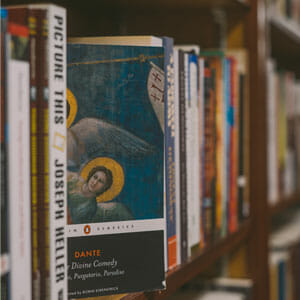Upper School (7-12)

Classrooms are lively places for conversations around the Great Books.
If you had the opportunity to walk into two classrooms side by side where one was filled with students skimming online excerpts and taking multiple choice tests and one was filled with students reading and discussing the most consequential books of Western Civilization, the biggest difference in those two classrooms would be – joy. Those who have had the opportunity to digest or discern the thoughts and ideas of the Great Conversation are gifted with an expansive foundation of rigor and delight upon which to build any future accomplishments. Likewise, a generous assumption of a common human nature with people across time and place allows for students to receive forgotten insights and categories of thinking which also act as keys to their development as whole people.
Students study books such as The Odyssey, The Oresteia, Beowulf, The Aeneid, Nicomachean Ethics by Aristotle, On the Incarnation by Athanasius, The Consolation of Philosophy by Boethius, The Divine Comedy by Dante, Paradise Lost by Milton, The Brothers Karamazov by Dostoevskey, The Republic by Plato, Plutarch’s Lives, Peloponnesian Wars by Herodotus, City of God by Augustine, The Communist Manifesto by Marx, Meditations on First Philosophy by Descartes to name a few.

Students experience personal mentoring at a crucial age.
By seventh grade, though the foundation of basic skills may be laid, the deeper formation of the mature person is nowhere complete. PCS cultivates an intentional environment where teacher mentors provide daily scaffolding to help students grow to love worthy pursuits and invest in things that last.

We approach education in an unabashedly traditional way.
A rigorous Latin program comes to mind when one imagines a traditional, classical education and that is certainly a key element at PCS, but it is also more than that. While modern education is consumed with technological progress, PCS embraces an “ad fontes” philosophy. Ad Fontes in Latin means “(back) to the sources.” This is a posture as much as it is a program. Instead of taking a short-term view teaching technological skills which may become obsolete, we focus on the long view. This means building the intellectual and moral virtues that undergird all learning, all work, and any good life. A modern utilitarian approach asks, “What will I do with this?” We believe the more pertinent question should be, “What will this learning do to me?”

PCS nurtures faith formation in students as they journey to live and think distinctly as Christian adults.
Christian parents choosing PCS are not naive. They understand that even weekly church attendance might not be enough to ensure their child resists the alternative spiritual formation provided by digital media, T.V. shows, influencers, pop stars, and peers. Therefore, PCS joins the team of the parents and local churches to teach students to love the Lord, understand the Bible, and judge and reason in every realm of life – like a Christian.
